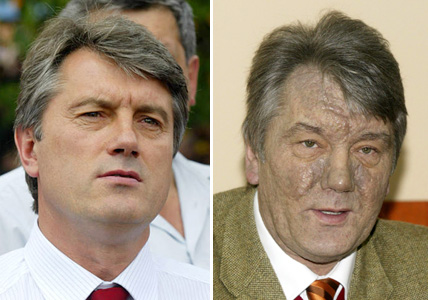Yushchenko, Viktor Andriyovich << YOOSH chehn kaw, VEEK tawr ahn DREE yoh vihch >> (1954-…), was president of Ukraine from 2005 to 2010. In 2004, he lost an election marred by fraud. Yushchenko supporters responded with massive protests that came to be known as the Orange Revolution. Yushchenko won a new election held later that year.

Yushchenko was born on Feb. 23, 1954, in Khoruzhivka, a town in northeastern Ukraine. At the time, Ukraine was a republic of the Soviet Union. Yushchenko graduated from the Ternopil Academy of National Economy in 1975. He began a career as a banker in the Ukrainian branch of the Soviet Union’s State Bank.
As the Soviet Union collapsed in 1991, Ukraine declared its independence. In 1993, Yushchenko became the governor of the National Bank of Ukraine. He helped guide the country through a difficult transition from an economy controlled by the government to a free-market economy. As leader of the National Bank, he fought against large-scale corruption and economic inefficiencies that hampered reform efforts.
In 1999, Ukraine’s president, Leonid Kuchma, chose Yushchenko to serve as prime minister. Yushchenko attempted to carry out reforms, but former Communists and the country’s powerful business interests both opposed his efforts. In 2001, members of Ukraine’s parliament loyal to these groups voted to remove Yushchenko from office. Yushchenko then became the leader of Our Ukraine, a political group opposed to Kuchma.
In 2004, Yushchenko ran for president. His chief rival was Prime Minister Viktor Yanukovych, who received support from Kuchma and from state-run television stations. In addition, Russian President Vladimir Putin announced his support for Yanukovych, who called for closer ties between Ukraine and Russia. In September, Yushchenko suffered a mysterious illness that left his face swollen and scarred. At the time, Yushchenko was leading in the presidential race. Medical tests later suggested that he had been poisoned with dioxin, a highly toxic synthetically produced chemical. Yushchenko supporters believed his political opponents, and possibly Russian agents, were behind the poisoning. An investigation into the poisoning was inconclusive.
In the election held on October 31, Yushchenko and Yanukovych each won about 40 percent of the vote. Ukrainian law called for a runoff election, which was held on November 21. Ukraine’s Central Election Commission declared Yanukovych the winner, but international observers reported widespread election fraud. Yushchenko’s supporters filled the streets of Ukraine’s largest cities to protest the results. This peaceful uprising became known as the Orange Revolution, after the campaign color of Yushchenko’s party.
In early December, Ukraine’s Supreme Court annulled (cancelled) the results of the runoff election and called for a new one to be held on December 26. Yushchenko won the second runoff election and took office in January 2005.
Yushchenko attempted to introduce a program of sweeping political and economic reforms, including closer alignment to the West. His plans were met with resistance from existing political interests. He was unable to create sustained economic improvement, and his popularity waned. In early 2010, he lost the presidency to Yanukovych.
